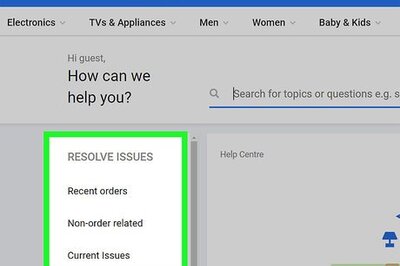
views
Learning to Suck Up Effectively

Go the extra mile with your work. Most people will notice if someone is putting in extra effort. If someone's opinion of you really matters to you, it should give you ample motivation to push yourself. Always make a point of doing a bit more than you're asked. Make your efforts visible to other people whenever you can. If you're at a workplace, do what you can to make it seem like you're moving around a lot. Even if you don't end up being more productive, it can be helpful to put on a show for the people around you. A lot of hard work can go unnoticed unless you stress a point of making it visible. Be careful not to take this too far. If it seems like you're trying to jump through as many hoops as you can just to impress, it will have a negative impact on the way you are perceived.

Acknowledge the person's interests. Everyone has a list of interests and values they put a great deal of importance on. These interests can relate to the setting you know the person in (e.g. work) but they may be unrelated. All the same, each interest is an opportunity to strengthen the kinship between the two of you. If you're trying to suck up to a family member, you should involve yourself in family activities. Most people regard family highly. If he's into sports, for example, you should bring up your love of a certain team. You probably won't be sincerely interested in everything that person values. Even so, you can at least acknowledge the worth of whatever he's into.

Remind the person of his or her importance to you. Everyone likes to be reminded now and again that their value is noticed by others. Regardless what your relation to the person you're sucking up to is, there are most likely positive ways that person has affected your life. Take a moment to let him know how he's changed your life for the better. If your life hasn't been influenced much by him, you can reiterate how much you respect him as a person. While the most effective type of significance-affirming compliment will come up in relation to an existing conversation, you can flat-out say something to the same effect. Going up to someone and complimenting him shouldn't be done if you feel you're getting the reputation of a "yes man". A thank-you card can achieve much of the same in this regard. Keep it short and to-the-point, and choose your words (and card) wisely.

Prioritize your own values before anyone else's. No one likes a sycophant or "yes man". Even if you're trying to get into somebody's good books, your best bet most of the time is to stand by the things that actually matter to you. Even if the person you're trying to impress won't agree with all of the things you value, there's a lot of respect due to someone who stands by what he or she believes in.

Get a grasp on what the person thinks of you beforehand. It can help to ask mutual acquaintances what said person thinks of you. Better still, if you're worried that asking people would alert him to the fact you're trying to suck up, analyze the way he or she reacted to you in past interactions. If you're sucking up to a boss, you could ask a coworker: "Hey, has the boss said anything about me lately?" If it's someone in a social or familial setting (such as a girlfriend's parents), you should ask someone your target would normally confide in what he knows about it. People tend to make their views apparent through body language. Smiling, a relaxed posture and steady eye contact are all positive signs.

Request help. People like it when they feel like their expertise is acknowledged. If you're in a professional environment, for example, going up to your boss and asking for some pointers is a healthy way of putting yourself on his or her radar. If there's something you feel you're struggling with, you have only to gain by asking for some pointers. Don't make your call for help sound like you're admitting to incompetence. Rather, make it clear you acknowledge you could stand to benefit from touching base with that person: "I've been looking for ways to improve on my efficiency for this project. If you've got the time, would you be able to show me a bit of the way you go about it?" This doesn't only apply to a professional situation. There are skills you could stand to pick up from anyone, whether it's a friend, significant other or family member. Gauge what your target is best at, and ask yourself if you would be interested in getting better at it. Don't ever get imposing with your request for help. People only like to help if they feel like it's their idea and they have a choice. Proficiency in a given skill is a good way to impress anyone. You'll benefit yourself in this regard by getting help.
Keeping Your Efforts Subtle

Be honest. Although honesty applies to a lot more than merely sucking up, sincerity will increase the chances of your success. The most important factor in whether or not a compliment is received well is the sincerity with which it's given. If you're trying to lie through your teeth as a way to get into someone's good books, chances are high the deceit will be noticed. Be only as bold with a compliment as you mean it. Moderate compliments often feel more impactful because they're more grounded in the real world. Instead of saying "You're the best looking person on the planet", for example, you could say "I think you take really good care of your appearance." Be warm and enthusiastic. Make the person feel you like them. Make positive comments. For example, you can say I love how passionate you are about your work. Make eye contact and smile during the conversation. It will give positive feedback to the person and show that you are having a nice time with them.

Take the opposing side of an argument at first. If you want the other person to respect your opinions, it helps to take the opposing view occasionally. If the two of you debate something, you can eventually shift your view to align with the other person's. This will give the impression that he or she has succeeded as a persuader, and he or she will associate positive feelings with you. This works in work and family situations alike. The payoff of this technique will flatter the person's persuasive skills, while simultaneously proving you're not afraid to stand by something. A transition from your original stance to the other person's should feel natural. When you change your mind, you can say something like this: "You know, you make a really good argument about this. I never thought about it that way before, and now I see why you held that view all along."

Flatter the person in moderation. Compliments are helpful, but they'll quickly grow tiresome if you're throwing them at the person in question. Even if someone may feel flattered that you care so much about his opinion, it's much better to emphasize the quality over quantity in your flattery. That way, he or she won't be desensitized to your positive opinions of him. Don't say compliments without planning them out first. If you're consciously trying to suck up to someone, this might manifest itself as a needless quantity of compliment.

Compliment the person in conversations with other people. You can usually count on people to spread information. While complimenting someone endlessly will lose its effect, telling mutual acquaintances that you really respect the person in question will eventually have that opinion get back to him. This is great if you want to impress someone's parents. You can compliment his parents in a conversation, and chances are he'll relay those kind words back to them. You should know which people are most likely to spread gossip around. These tend to be the loudest, fast-talking members of a given group. Mention something nice off-handedly to mutual contacts: "This reminds me, I've been really impressed with Person X's leadership skills lately. He's a great boss and really knows what he's doing." If you're sucking up to a significant other, you should tell his friends how great you think he is: "I feel like I'm really lucky to have him in my life."

Ask the person about his or her achievements. Flattery usually comes in the form of statements. Things like "You look great today" or "I really respect you" are effective in moderation, but they're easier to identify as acts of sucking up. Instead, flatter the person by asking questions about things he or she is proud of. Asking the person to tell you how he or she managed to accomplish a certain project brings attention to his or her merits. In this way, you can compliment someone while simultaneously feeding an open-ended conversation. For instance, you can ask: "I was really impressed by that project you did last Quarter. Could you tell me how you managed to pull off something that slick?"

Include someone in a group outing. If you include someone in a group outing, such as a dinner or party, he's not going to assume you're planning it for him specifically. However, the good intent of it will do well to put you in his good books. If you think you can do so without making your efforts too obvious, try to make that person feel special in the group.
Impressing Someone Without Sucking Up

Dress well. Dressing well does not necessarily mean a three-piece suit or fancy dress. It means wearing clothes that will make you look appropriate to the situation. A casual social setting isn't usually compatible with work wear, and vice-versa. If you're trying to suck up in a professional setting, remember the adage "Dress not for the job you have, but the job you want."

Be punctual. Punctuality is incredibly important for most work and social situations. Making sure you are on time for your obligations will increase others' trust in you. On the other hand, nothing kills respect faster than a habit of lateness. Try to get somewhere a bit early if you can manage it. This will reduce the risk of unforeseen delays, and you won't feel as stressed to get anywhere on time.

Assume an assertive role. Assertive people make their thoughts and feelings known. They get things done promptly and have a strong sense of self-motivation. It goes without saying that a success-driven individual will have a far easier time impressing people. If you are shy, try to gradually increase things like your speech volume and walking pace. When you get certain aspects of the body language down, you'll find acting the part comes more naturally. Looking assertive will have a positive effect on your perceived work efficiency. If nothing else, make sure to fix your posture. Keep your back straight, your shoulders back, and stand as tall as you can.

Conform to the expectations of your environment. A person's respectability is defined partially by how well they're able to adjust to a given setting or situation. For instance, if you're at a funeral, you will be judged in part by how closely you match the social norms. If there's a situation where you're not sure how to act, look at the people around you for an example. Research a type of event beforehand to see what's generally expected. Failing that, ask someone who will be going there as well. Certain family events (like funeral) may have specific requirements base on the given family situation.

Mirror the other person's body language. People gauge others' body language as an indicator of their feelings. If you mimic the other person's body language, it will give the impression that the two of you are operating on the same wavelength. Whether the other person consciously notices it or not, it will help the two of you interact more smoothly. Keep an eye on his or her body posture. Do your best to copy it. This is especially good if the person expresses confident body language, as you'll have a positive example to follow right before your eyes.

Keep your image consistent. If you want to be received by people as a reliable and trustworthy individual, you should make a point of giving a consistent impression across your interactions. Someone in a good mood can charm their peers on one day, but that progress will be lost if they're standoffish the next day. Consistency is also one of the reason why you shouldn't go overboard with your charm or effort. Even the most dedicated suck-up won't be able to hold a momentum like that for long.

Maintain a positive attitude. A positive attitude will benefit every aspect of your life. People are easily impressed by someone who gives off a cheerful disposition. If you find you struggle with seeing the positive side of things, do your best to eliminate negative thoughts in your mind. Replace unconstructive thoughts with positives. For example, if you're running late for work one day, try to rationalize the mistake. Let yourself learn from it rather than get stressed over it. "I know that I shouldn't have been late today, but it doesn't mean o much when all is said. I'll just make sure to learn from this mistake and see that it doesn't happen in the future."















Comments
0 comment